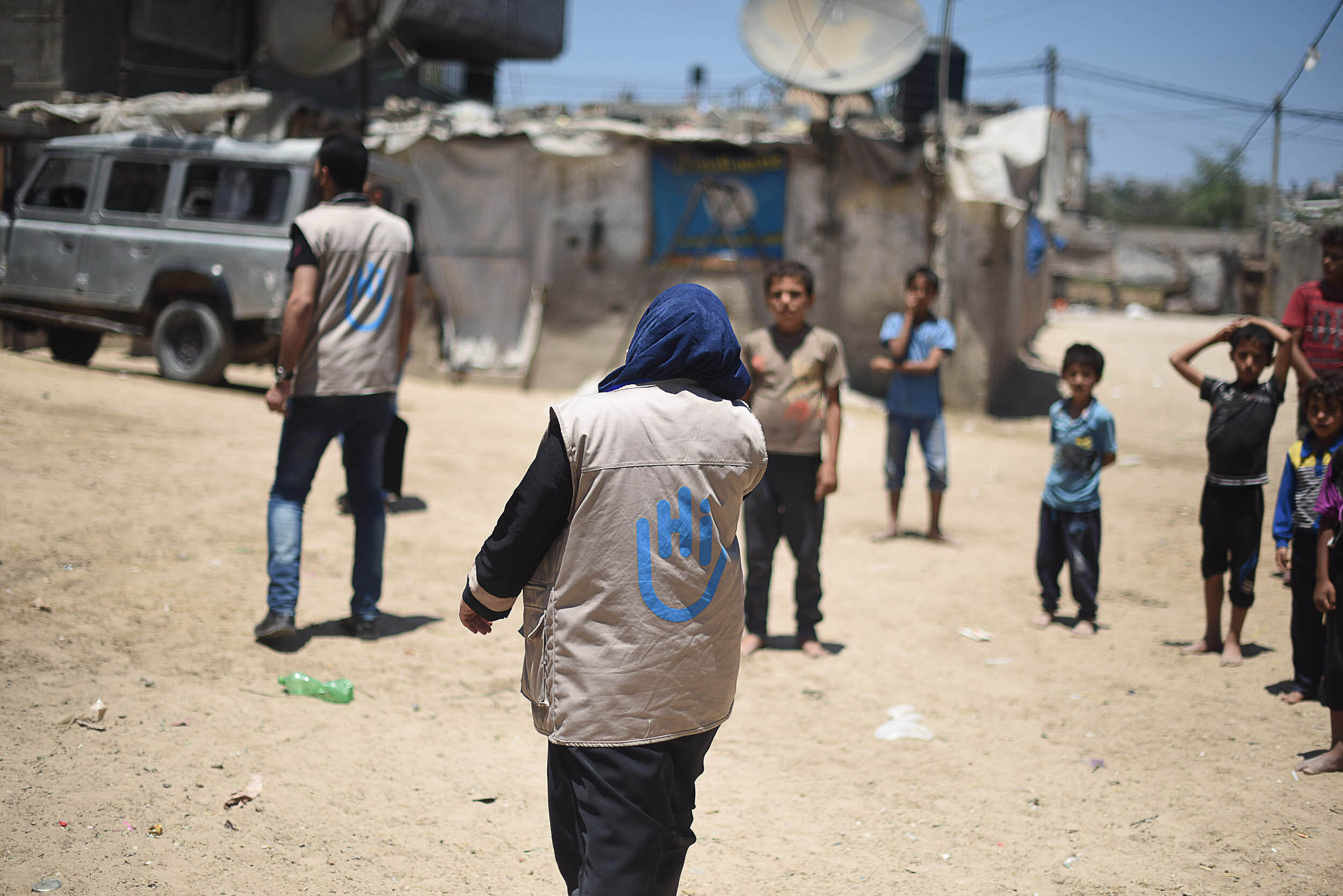
CASE STUDY
Expert design of elearning helps humanitarian aid reach disabled people
Humanity & Inclusion (HI) works to improve the living conditions of people with disabilities in conflict and disaster zones.
They had secured funding for elearning to help humanitarian agencies better include the 15% of people needing humanitarian assistance who have a disability. We helped HI to develop highly-effective content and built them robust online modules, for use in the most challenging conditions.
The challenge
HI’s research highlighted a desperate need for aid agencies to measure how well their programmes reach and support people with disabilities. They set out to create an accessible elearning module in three languages (English, French and Arabic) for use across the world. The course needed to be suitable for lone learners and facilitate blended learning in a huge range of organisations – including grassroots operators in areas with minimal infrastructure.
Key points
Instructional design support
Adapt elearning authoring
Elearning translation and multi-language design
Our approach
HI had already decided they wanted their own subject experts to fully script the content. Although experienced in instructor-led training and capacity building for their sector, they’d no experience of creating online content. They also needed someone to build their course.
“Working with Can Studios has been great for us. We’ve learned so much about instructional design, the authoring tool and the process.
There’s been a real transfer of knowledge – and that will continue to benefit the humanitarian community way beyond this project.”
Pauline Thivillier
Disability Specialist, Humanity & Inclusion
Our priority was ensuring HI got the best long term impact from the funding they’d secured.
In terms of the learning, it meant ensuring they took away a product that would drive genuine operational and behavioural change. To do that we had to get the instructional fundamentals right before we began the technical build.
In terms of the production process, this meant helping them work efficiently and get things right the first time.
We built this elearning using our Adapt authoring tool. Adapt’s HTML5 content is fully responsive – making it ideal for learners in the field who rely on mobile devices. It also offers the best possible experience for learners using assistive technology, such as screen readers.
Rather than simply provide a template course for HI to populate, we worked with HI from first principles, helping with:
High level design
HI’s sector consultation revealed huge variation in disability awareness. This meant their course needed to cover more material than they’d anticipated. Our team helped them balance sufficient scope, meeting their objectives and ensuring the project stayed on schedule and on budget. We also helped develop a modular structure that provided logical build-up of information, keeping the course relevant and efficient for learners with different base knowledge.
Instructional design
Our experts acted as a sounding board for HI as they developed the learning points for each module. With expertise in the specific pedagogy of elearning, and the objectivity of an outsider, they were able to suggest specific improvements at an early stage. This included proposing mechanisms to actively engage learners, spotting gaps in the logical flow and creating more effective knowledge checks. Feeding these in early avoided changes later, at the more costly build stage.
Script and storyboard
We gave the HI team a thorough induction to the Adapt authoring tool. This meant they could script content to make the most of Adapt’s interactivity and accessibility. We also provided script guides that ensured HI’s content would technically be able to be built in all three languages and provide a good learner experience.
Only then did our in-house designers build the final elearning modules – providing custom graphics and visual design as well optimising accessibility for learners using assistive technology. Because it uses HTML5, Adapt elearning is fully mobile responsive. But we also optimised the content for translation and use over low bandwidth.
HI already have in-house translators, so we worked with them to manage the final stage:
translation of all the course elements into French and Arabic
importing the translations into Adapt and dealing with necessary design adjustments to cope with different text lengths and directions
ensuring everything still provided the best possible learner experience and was accessible via assistive technology.
Results
The English language version of Collecting Data for the Inclusion of Persons with Disabilities in Humanitarian Action was released in February 2019, swiftly followed by the French and Arabic versions.
The online course incorporates a facilitator pack for those who need to train data collectors and supporting resources for practical application of the tools in humanitarian settings.
Humanity and Inclusion have been delighted with the results. Rates of uptake have been excellent. This, combined with anecdotal praise and the uptake of the English version in Arabic-speaking regions (ahead of the Arabic version’s release and promotion) suggests word-of-mouth recommendations across the aid community.

In a survey of 169 people who completed the elearning soon after it’s release, 95% said they felt confident to apply what they had learned in their work.
In fact it’s been so successful that discussion about a Spanish version began just weeks after the initial release.
This effective piece of elearning, which promotes itself, looks set to be an important tool for Humanity & Inclusion in their mission to help practitioners and agencies to understand the situation of people with disabilities in humanitarian contexts.
And that will reap benefits for the estimated 15% of people affected by humanitarian crises who have a disability.
Find out more at humanity-inclusion.org.uk and find the course on kayaconnect.org and disasterready.org
“We’re very proud of this elearning. Other organisations are saying ‘It’s amazing! How did you do it?’ We’d never have created a course of such a high standard without Can Studio’s expertise, tools and support.”
Pauline Thivillier
Disability Specialist, Humanity & Inclusion



